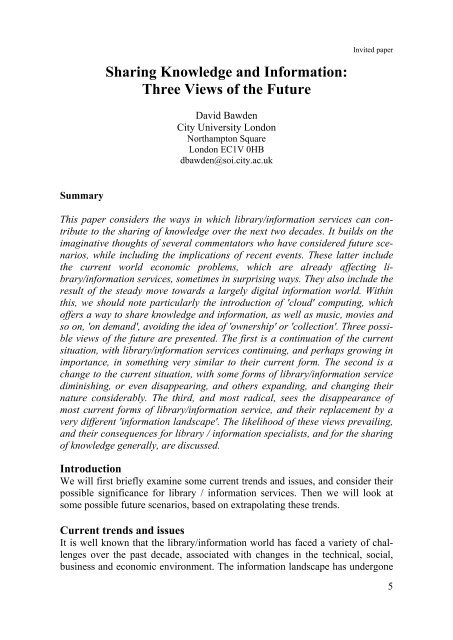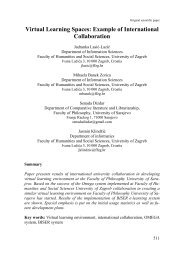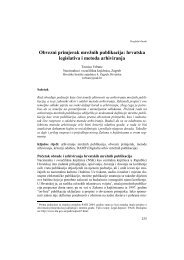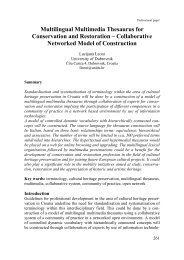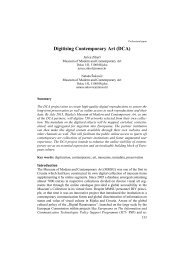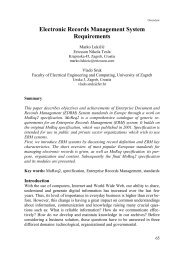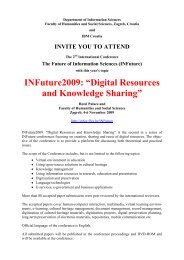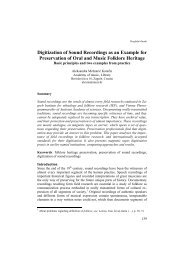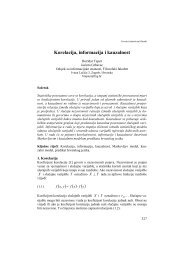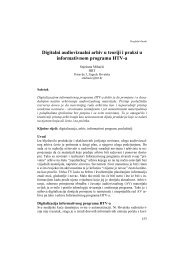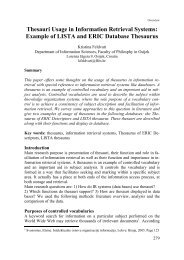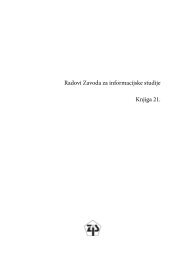Sharing Knowledge and Information: Three Views of the Future
Sharing Knowledge and Information: Three Views of the Future
Sharing Knowledge and Information: Three Views of the Future
You also want an ePaper? Increase the reach of your titles
YUMPU automatically turns print PDFs into web optimized ePapers that Google loves.
Summary<br />
<strong>Sharing</strong> <strong>Knowledge</strong> <strong>and</strong> <strong>Information</strong>:<br />
<strong>Three</strong> <strong>Views</strong> <strong>of</strong> <strong>the</strong> <strong>Future</strong><br />
David Bawden<br />
City University London<br />
Northampton Square<br />
London EC1V 0HB<br />
dbawden@soi.city.ac.uk<br />
Invited paper<br />
This paper considers <strong>the</strong> ways in which library/information services can contribute<br />
to <strong>the</strong> sharing <strong>of</strong> knowledge over <strong>the</strong> next two decades. It builds on <strong>the</strong><br />
imaginative thoughts <strong>of</strong> several commentators who have considered future scenarios,<br />
while including <strong>the</strong> implications <strong>of</strong> recent events. These latter include<br />
<strong>the</strong> current world economic problems, which are already affecting library/information<br />
services, sometimes in surprising ways. They also include <strong>the</strong><br />
result <strong>of</strong> <strong>the</strong> steady move towards a largely digital information world. Within<br />
this, we should note particularly <strong>the</strong> introduction <strong>of</strong> 'cloud' computing, which<br />
<strong>of</strong>fers a way to share knowledge <strong>and</strong> information, as well as music, movies <strong>and</strong><br />
so on, 'on dem<strong>and</strong>', avoiding <strong>the</strong> idea <strong>of</strong> 'ownership' or 'collection'. <strong>Three</strong> possible<br />
views <strong>of</strong> <strong>the</strong> future are presented. The first is a continuation <strong>of</strong> <strong>the</strong> current<br />
situation, with library/information services continuing, <strong>and</strong> perhaps growing in<br />
importance, in something very similar to <strong>the</strong>ir current form. The second is a<br />
change to <strong>the</strong> current situation, with some forms <strong>of</strong> library/information service<br />
diminishing, or even disappearing, <strong>and</strong> o<strong>the</strong>rs exp<strong>and</strong>ing, <strong>and</strong> changing <strong>the</strong>ir<br />
nature considerably. The third, <strong>and</strong> most radical, sees <strong>the</strong> disappearance <strong>of</strong><br />
most current forms <strong>of</strong> library/information service, <strong>and</strong> <strong>the</strong>ir replacement by a<br />
very different 'information l<strong>and</strong>scape'. The likelihood <strong>of</strong> <strong>the</strong>se views prevailing,<br />
<strong>and</strong> <strong>the</strong>ir consequences for library / information specialists, <strong>and</strong> for <strong>the</strong> sharing<br />
<strong>of</strong> knowledge generally, are discussed.<br />
Introduction<br />
We will first briefly examine some current trends <strong>and</strong> issues, <strong>and</strong> consider <strong>the</strong>ir<br />
possible significance for library / information services. Then we will look at<br />
some possible future scenarios, based on extrapolating <strong>the</strong>se trends.<br />
Current trends <strong>and</strong> issues<br />
It is well known that <strong>the</strong> library/information world has faced a variety <strong>of</strong> challenges<br />
over <strong>the</strong> past decade, associated with changes in <strong>the</strong> technical, social,<br />
business <strong>and</strong> economic environment. The information l<strong>and</strong>scape has undergone<br />
5
IN<strong>Future</strong>2009: “Digital Resources <strong>and</strong> <strong>Knowledge</strong> <strong>Sharing</strong>”<br />
remarkable changes in consequence; most particularly as a result <strong>of</strong> <strong>the</strong> move<br />
towards a predominantly digital <strong>and</strong> networked provision <strong>of</strong> information. All<br />
sectors <strong>of</strong> library/information services – including national, public, academic,<br />
industrial/commercial <strong>and</strong> governmental services – have changed greatly in response,<br />
though in different ways according to <strong>the</strong>ir situation.In <strong>the</strong> past two<br />
years, <strong>the</strong>se forces for change have intensified, <strong>and</strong> <strong>the</strong>ir effects – actual <strong>and</strong><br />
potential – on <strong>the</strong> library/information world have been seen more clearly. While<br />
one might point to a very wide range <strong>of</strong> such forces <strong>and</strong> influences, it is possible<br />
to identify a few particularly significant examples, in order to examine <strong>the</strong>ir effects.<br />
The economic situation<br />
The economic downturn worldwide, <strong>and</strong> <strong>the</strong> likelihood that it will last for some<br />
years, with enduring effects <strong>the</strong>reafter, cannot fail to affect all <strong>the</strong> library/information<br />
sectors. We may assume that many <strong>of</strong> <strong>the</strong>se effects, at least<br />
initially, will be negative. In <strong>the</strong> UK, we have seen a local municipality attempting<br />
to close <strong>the</strong> majority <strong>of</strong> its public library branches in response to economic<br />
problems; this provoking appeals to central government to over-rule <strong>the</strong><br />
action. We have similarly seen an immediate decline in information-related jobs<br />
in <strong>the</strong> commercial sector. No doubt such problems will continue, <strong>and</strong> will be<br />
observed worldwide. On <strong>the</strong> more positive side, in <strong>the</strong> UK at least, <strong>the</strong> economic<br />
situation has prompted a ‘back to basics’ mentality. There is some evidence<br />
that this includes a re-found enthusiasm for libraries, for books, for borrowing<br />
ra<strong>the</strong>r than buying, <strong>and</strong> for sharing <strong>and</strong> collaborating. Not least, <strong>the</strong>re is<br />
a renewed emphasis on <strong>the</strong> sharing <strong>of</strong> knowledge <strong>and</strong> expertise. All <strong>of</strong> <strong>the</strong>se<br />
things could, paradoxically perhaps, result in more, ra<strong>the</strong>r than less, support for<br />
libraries <strong>and</strong> o<strong>the</strong>r ‘information institutions’.<br />
Digital world<br />
We have now reached a situation where, in most situations in Europe <strong>and</strong> North<br />
America at least, digital information is <strong>the</strong> norm. Printed materials are ei<strong>the</strong>r byproducts<br />
<strong>of</strong> digital originals, or are ripe for digitisation, as in <strong>the</strong> massive book<br />
digitisation projects being supported by Google, Micros<strong>of</strong>t <strong>and</strong> o<strong>the</strong>rs. Academic<br />
<strong>and</strong> pr<strong>of</strong>essional journals are now invariably wholly or mainly digital in<br />
form, as are almost all business information resources. E-books are only slowly<br />
gaining in popularity, but new developments in e-paper <strong>and</strong> e-readers imply that<br />
a tipping point to wide availability <strong>of</strong> e-books, <strong>and</strong> perhaps also e-newspapers,<br />
may come soon. This has led many commentators to make assumption that all<br />
libraries <strong>and</strong> o<strong>the</strong>r information collections are on a track towards a necessarily<br />
all-digital future. However, one <strong>of</strong> <strong>the</strong> aspects <strong>of</strong> <strong>the</strong> economic downturn noted<br />
above, <strong>and</strong> consequent feelings <strong>of</strong> uncertainty about <strong>the</strong> current <strong>and</strong> future state<br />
<strong>of</strong> society in <strong>the</strong> developed world, has been a renewed enthusiasm for <strong>the</strong> ‘real’.<br />
This has included an enthusiasm for collections <strong>of</strong> real things, including real<br />
6
D. Bawden, <strong>Sharing</strong> <strong>Knowledge</strong> <strong>and</strong> <strong>Information</strong><br />
books. This <strong>of</strong>fers an interesting possible corrective to <strong>the</strong> idea that <strong>the</strong> move to<br />
an all-digital world is inevitable <strong>and</strong> universally welcomed.<br />
Web 2 <strong>and</strong> <strong>the</strong> Amazoogle<br />
The success <strong>of</strong> internet-based information systems, from search engines to<br />
online retailers, has led to such systems providing a ‘ideal type’, by which all<br />
information provision is to be judged. Google has had such an impact in this respect<br />
that ‘to Google’ is now a respectable English verb, meaning to search for<br />
information. Similarly <strong>the</strong> Amazon book retailer has provided a model for digital<br />
interactions which has proved more acceptable that <strong>the</strong> kind <strong>of</strong> interface <strong>of</strong>fered<br />
by libraries <strong>and</strong> information services. Wikipedia, for al its known deficiencies,<br />
has become <strong>the</strong> model for reference information, for most people. The<br />
rapid penetration into everyday life <strong>of</strong> social networking sites such as Facebook,<br />
<strong>and</strong> o<strong>the</strong>r Web 2 facilities such as Twitter, has been ano<strong>the</strong>r factor which has<br />
altered <strong>the</strong> way in which most people – including students <strong>and</strong> pr<strong>of</strong>essional<br />
workers - expect to receive information. Library <strong>and</strong> information services have<br />
been slow to respond to <strong>the</strong>se developments; not surprisingly, in view <strong>of</strong> <strong>the</strong>ir<br />
rapidity. Reponses have generally taken one <strong>of</strong> two forms. Attempts have been<br />
made to point out <strong>the</strong> limitations <strong>of</strong> <strong>the</strong>se new models, <strong>and</strong> <strong>the</strong> dangers <strong>of</strong> relying<br />
on <strong>the</strong>m; this has generally been ineffective, pitted against <strong>the</strong> great advantages<br />
<strong>of</strong> speed, simplicity <strong>and</strong> ‘image’ possessed by Web 2. Alternatively, libraries<br />
<strong>and</strong> o<strong>the</strong>r information providers have attempted to join <strong>the</strong> new world,<br />
by providing ‘Google-like’ interfaces, <strong>and</strong> by linking to social networking sites.<br />
While this approach <strong>of</strong>fers advantages, <strong>the</strong>re is a danger that <strong>the</strong> value <strong>of</strong> sophisticated<br />
access to structured collections – one <strong>of</strong> <strong>the</strong> main advantages <strong>of</strong>fered<br />
in ‘library-like’ environments – may be dissipated.<br />
The new generations<br />
Studies <strong>of</strong>, <strong>and</strong> anecdotal experience with, <strong>the</strong> younger generations who have<br />
grown up used to ubiquitous digital information give a mixed viewpoint. There<br />
seems little doubt that Gen Y, <strong>the</strong> Google generation, <strong>the</strong> ‘digital natives’, or<br />
however we might want to label <strong>the</strong>m, have different expectations <strong>of</strong> information<br />
provision, <strong>and</strong> different information practices, to <strong>the</strong>ir predecessors. But<br />
studies do not always agree with received opinion. They show, for example, that<br />
younger people, while certainly confident with technology, lack an underst<strong>and</strong>ing<br />
<strong>of</strong> its nature, <strong>and</strong> even more lack underst<strong>and</strong>ing <strong>of</strong> information resources,<br />
<strong>and</strong> lack <strong>the</strong> skills to interpret <strong>and</strong> us information well. Their fluency with digital<br />
information is more apparent than real. And while it is <strong>of</strong>ten assumed that<br />
<strong>the</strong> new generations have no interest in libraries, <strong>and</strong> no desire to use <strong>the</strong>m,<br />
studies show that <strong>the</strong>y read more than <strong>the</strong>ir predecessors, <strong>and</strong> appreciate advice<br />
from ‘information experts’. The idea that <strong>the</strong>re is a novel capability for multitasking,<br />
<strong>and</strong> absorbing <strong>and</strong> using information from many sources, is countered<br />
by concerns about ‘attention deficit syndrome’ <strong>and</strong> ‘continuous partial atten-<br />
7
IN<strong>Future</strong>2009: “Digital Resources <strong>and</strong> <strong>Knowledge</strong> <strong>Sharing</strong>”<br />
tion’. Solid information on our users <strong>of</strong> <strong>the</strong> future is largely lacking. It seems<br />
unwise to plan <strong>the</strong> future based on assumptions. It is this concern that has led<br />
<strong>the</strong> British Library to support <strong>the</strong> ‘Google Generation’ study mentioned in <strong>the</strong><br />
fur<strong>the</strong>r reading, <strong>and</strong> in 2009 to sponsor a study <strong>of</strong> <strong>the</strong> preceding ‘Generation Y’.<br />
The cloud<br />
One <strong>of</strong> <strong>the</strong> most interesting new trends is <strong>the</strong> movement towards ‘cloud computing’,<br />
whereby information resources <strong>of</strong> all kinds will not be held in a collection,<br />
owned by a person or an institution, but will be stored on a networked,<br />
with wireless access from any place. In 2009, this has been illustrated strongly<br />
by public enthusiasm for <strong>the</strong> Spotify s<strong>of</strong>tware, which enables music <strong>and</strong> videos<br />
to be downloaded on request from <strong>the</strong> cloud. This, if widely accepted, could<br />
mean an end to personal collections <strong>of</strong> CDs, DVDs, etc. It may not be too farfetched<br />
to imagine that books, newspaper items <strong>and</strong> journal articles could be<br />
delivered in <strong>the</strong> same way. This would call into question <strong>the</strong> whole need for <strong>the</strong><br />
‘collection’, which has been <strong>the</strong> basis for libraries <strong>and</strong> information services<br />
since <strong>the</strong>ir inception in <strong>the</strong> ancient world. There are <strong>of</strong> course many issues here,<br />
<strong>and</strong> whe<strong>the</strong>r it would be acceptable for all purposes, is a debatable point.<br />
Trend summary<br />
This brief overview <strong>of</strong> some currently prominent issues gives us a ra<strong>the</strong>r mixed<br />
picture. We see some general trends, but <strong>of</strong>ten with ‘counter-movements’ to<br />
suggest that <strong>the</strong> future is not entirely clear.<br />
Futurology <strong>and</strong> scenarios<br />
There is a long tradition <strong>of</strong> ‘futurology’ in <strong>the</strong> library <strong>and</strong> information sciences,<br />
with a particular interest in outlining possible scenarios <strong>of</strong> what <strong>the</strong> information<br />
world will be like in future years. Shuman’s collections <strong>of</strong> scenarios for ‘libraries<br />
<strong>of</strong> <strong>the</strong> future’ have been especially influential, <strong>and</strong> <strong>the</strong> writings <strong>of</strong> Sapp <strong>and</strong><br />
Pennevaria are also interesting. We will now look at three possible, very general,<br />
futures for <strong>the</strong> library / information world, based on, <strong>and</strong> accepting some <strong>of</strong><br />
<strong>the</strong> contradictions <strong>of</strong>, <strong>the</strong> trends noted above.<br />
Scenario 1: business as usual<br />
Libraries, <strong>and</strong> o<strong>the</strong>r information providers, have a generally good ‘br<strong>and</strong> image’,<br />
much goodwill, <strong>and</strong> an established place in many settings. One possible<br />
future would <strong>the</strong>refore be largely a continuation <strong>of</strong> <strong>the</strong> current situation, with library/information<br />
services continuing, <strong>and</strong> perhaps growing in importance, in<br />
something very similar to <strong>the</strong>ir current form. This seems unlikely, especially in<br />
view <strong>of</strong> <strong>the</strong> increasing emphasis <strong>of</strong> digital networked information. On <strong>the</strong> o<strong>the</strong>r<br />
h<strong>and</strong>, we might set against this <strong>the</strong> observed continuing, <strong>and</strong> to a degree renewed,<br />
enthusiasm for reading, for collections, for ‘real’ things in general, <strong>and</strong><br />
for a more shared <strong>and</strong> community-minded approach. If <strong>the</strong>se trends continue,<br />
8
D. Bawden, <strong>Sharing</strong> <strong>Knowledge</strong> <strong>and</strong> <strong>Information</strong><br />
<strong>and</strong> in particular if <strong>the</strong>re is a back-lash against immersion in a virtual environment,<br />
<strong>the</strong>n we might expect to see <strong>the</strong> traditional ‘collection <strong>and</strong> place’ form <strong>of</strong><br />
library <strong>and</strong> information service regaining something <strong>of</strong> its former status. This<br />
would almost certainly be true in some sectors more than o<strong>the</strong>rs, <strong>and</strong> in all cases<br />
will involve a considerable extension into digital provision. But we should not<br />
assume, as it <strong>of</strong>ten is assumed, that radical change is inevitable.<br />
Scenario 2: changing l<strong>and</strong>scapes<br />
This scenario involves a change to <strong>the</strong> current situation, affecting <strong>the</strong> library/information<br />
sectors in various ways. Under <strong>the</strong> influence <strong>of</strong> <strong>the</strong> negative<br />
(at least for traditional library / information provision) trends noted above, we<br />
might expect to see some forms <strong>of</strong> library/information service diminishing, or<br />
even disappearing. O<strong>the</strong>rs, conversely, might be expected to exp<strong>and</strong>, <strong>and</strong> to<br />
change <strong>the</strong>ir nature considerably. We can already see some evidence <strong>of</strong> <strong>the</strong> sort<br />
<strong>of</strong> change which may be anticipated from developments in university libraries<br />
in Europe <strong>and</strong> North America. Many are moving from a role purely as a ra<strong>the</strong>r<br />
passive information provider, to a more active involvement in teaching, <strong>and</strong> to<br />
provision <strong>of</strong> study spaces extending into a ‘social space’ dimension. Similar<br />
changes are to be seen in <strong>the</strong> public library sector, with UK libraries morphing<br />
into ‘Ideas Stores’ <strong>and</strong> ‘Discovery Centres’. Throughout Europe, <strong>the</strong>re is a trend<br />
to involve <strong>the</strong> public library service more closely in <strong>the</strong> wider social <strong>and</strong> cultural<br />
environment. In a commercial environment, this is seen as an increased<br />
emphasis on knowledge management, though perhaps not using that term. Diminishment<br />
can be seen in <strong>the</strong> UK public library examples noted above; falls in<br />
usage can be seen in many European countries, leading to fears for <strong>the</strong> longterm<br />
survival <strong>of</strong> such services. Reduction in provision can also be seen in commercial<br />
<strong>and</strong> industrial information services, as <strong>the</strong> economic downturn exacerbates<br />
longer-term trends. Conversely, information services in law <strong>and</strong> in healthcare<br />
are, if anything, exp<strong>and</strong>ing in <strong>the</strong> UK, albeit accompanied by many<br />
changes in <strong>the</strong>ir structure <strong>and</strong> functions. This illustrates <strong>the</strong> way in which <strong>the</strong><br />
various sectors are responding differently to <strong>the</strong> changing environment. Perhaps<br />
<strong>the</strong> one constant in <strong>the</strong>se factors is <strong>the</strong> extent to which <strong>the</strong> successful services<br />
are managing to refocus <strong>the</strong> balance between physical <strong>and</strong> digital presence.<br />
This, along with a good awareness <strong>of</strong> user needs, <strong>and</strong> an ability to ‘play to <strong>the</strong><br />
strengths’ <strong>of</strong> <strong>the</strong> ‘library br<strong>and</strong>’, seems to still be <strong>the</strong> requisite for success.<br />
Scenario 3: into <strong>the</strong> clouds<br />
This scenario is <strong>the</strong> most radical. It assumes that <strong>the</strong> 'cloud' computing model<br />
has become pervasive, that it delivers texts <strong>and</strong> images in <strong>the</strong> same way as it is<br />
currently beginning to deliver music <strong>and</strong> video, <strong>and</strong> that such delivery has become<br />
accepted as <strong>the</strong> norm by most people. We might also expect that much<br />
more <strong>of</strong> this material would be free to use, in an extension <strong>of</strong> current trends with<br />
entertainment material, <strong>of</strong> <strong>the</strong> open access movement for academic resources.<br />
9
IN<strong>Future</strong>2009: “Digital Resources <strong>and</strong> <strong>Knowledge</strong> <strong>Sharing</strong>”<br />
This would mark <strong>the</strong> end <strong>of</strong> <strong>the</strong> 'collection' – whe<strong>the</strong>r <strong>of</strong> books, <strong>of</strong> music, or <strong>of</strong><br />
photographs – as a feature <strong>of</strong> <strong>the</strong> lives <strong>of</strong> those who replied on cloud delivery.<br />
Similar, even one's own documents would not be stored on any local device, but<br />
would be uploaded to <strong>the</strong> cloud, to be retrieved when needed. This would involve<br />
a fairly major change in attitudes, as well as information practices, <strong>and</strong> it<br />
is not clear to what extent this would be welcomed. Issues <strong>of</strong> preservation, both<br />
technical <strong>and</strong> cultural, would become a particularly important issue. The impact<br />
<strong>of</strong> library / information services would be pr<strong>of</strong>ound. Their collections – hi<strong>the</strong>rto<br />
<strong>the</strong>ir defining feature – would now take <strong>the</strong> form <strong>of</strong> criteria for selection <strong>of</strong> material<br />
from <strong>the</strong> cloud. This would take <strong>the</strong> process begun by <strong>the</strong> move to <strong>the</strong><br />
'digital library', with collections being defined by selection criteria ra<strong>the</strong>r than<br />
by ownership or by physical location, to a much greater limit. The library might<br />
cease to exist as an institution, <strong>and</strong> might take <strong>the</strong> form simply <strong>of</strong> advisory services,<br />
assisting patrons with selection <strong>of</strong> cloud material, <strong>and</strong> subsequent use.<br />
Lacking a physical location, <strong>and</strong> managed collection, library / information services<br />
would, if <strong>the</strong>y were to survive at all, have to become more deeply embedded<br />
in <strong>the</strong> life <strong>and</strong> work <strong>of</strong> <strong>the</strong>ir patrons. Conversely however, we might find<br />
that a reaction might set in to <strong>the</strong> cloud environment. There might be a dem<strong>and</strong><br />
for a return to <strong>the</strong> 'traditional' values <strong>of</strong> managed <strong>and</strong> organised collections, <strong>and</strong><br />
for a revival <strong>of</strong> <strong>the</strong> 'information place' for study, reflection, <strong>and</strong> social interaction<br />
focused on cultural issues. Libraries <strong>and</strong> information centres would be<br />
seem to be well placed to meet that need.<br />
Conclusions<br />
Current trends show a number <strong>of</strong> paradoxical <strong>and</strong> contradictory developments.<br />
Predicting <strong>the</strong> future based on <strong>the</strong>m cannot <strong>the</strong>refore be straightforward. The<br />
history <strong>of</strong> prediction <strong>and</strong> futurology in <strong>the</strong> library / information sciences has<br />
shown both <strong>the</strong> failures <strong>of</strong> imagination <strong>and</strong> <strong>of</strong> nerve identified by Arthur C<br />
Clarke. For <strong>the</strong> most part, <strong>the</strong> most striking developments, from <strong>the</strong> home computer,<br />
to <strong>the</strong> web, to <strong>the</strong> cloud, were not clearly anticipated before <strong>the</strong>ir arrival.<br />
Yet, despite many grim predictions to <strong>the</strong> contrary, libraries <strong>and</strong> information<br />
services have survived so far. They have done so by a mix <strong>of</strong> holding on to <strong>the</strong>ir<br />
traditional purposes <strong>and</strong> roles, <strong>and</strong> <strong>of</strong> reinventing <strong>the</strong>mselves to suit <strong>the</strong>ir new<br />
environment. In <strong>the</strong> inherently unpredictable times to come, a mixture <strong>of</strong> <strong>the</strong>se<br />
strategies will be needed. So, also, will be research <strong>and</strong> reflection on developments,<br />
<strong>and</strong> on <strong>the</strong> ways in which information providers can be respond. The<br />
sharing <strong>of</strong> knowledge is likely to be more important than ever in coming years,<br />
<strong>and</strong> information specialists have a great contribution to make.<br />
10
D. Bawden, <strong>Sharing</strong> <strong>Knowledge</strong> <strong>and</strong> <strong>Information</strong><br />
References<br />
Atkinson, R., Contingency <strong>and</strong> Contradiction: <strong>the</strong> place(s) <strong>of</strong> <strong>the</strong> library at <strong>the</strong> dawn <strong>of</strong> <strong>the</strong> new<br />
millennium, Journal <strong>of</strong> <strong>the</strong> American Society for <strong>Information</strong> Science <strong>and</strong> Technology, 2001,<br />
52(1), 3-11<br />
Bawden, D., The nature <strong>of</strong> prediction <strong>and</strong> <strong>the</strong> information future: Arthur C Clarke’s Odyssey vision,<br />
Aslib Proceedings, 1997, 49(3), 57-60<br />
Pennavaria, K., Representations <strong>of</strong> books <strong>and</strong> libraries in depictions <strong>of</strong> <strong>the</strong> future, Libraries <strong>and</strong><br />
Culture, 2002, 37(3), 229-248<br />
Rowl<strong>and</strong>s I., et.al., The Google generation: <strong>the</strong> information behaviour <strong>of</strong> <strong>the</strong> researcher <strong>of</strong> <strong>the</strong> future,<br />
Aslib Proceedings, 2008, 60(4), 290-310<br />
Sapp, G., A brief history <strong>of</strong> <strong>the</strong> future <strong>of</strong> libraries, Lanham MD: Scarecrow Press, 2002<br />
Shuman, B. A., Beyond <strong>the</strong> Library <strong>of</strong> <strong>the</strong> <strong>Future</strong>: more alternative futures for <strong>the</strong> public library,<br />
Englewood CO: Libraries Unlimited, 1997<br />
Shuman, B. A., The Library <strong>of</strong> <strong>the</strong> <strong>Future</strong>: alternative scenarios for <strong>the</strong> information pr<strong>of</strong>ession,<br />
Englewood CO: Libraries Unlimited, 1989<br />
Williams, P., et.al., The 'Google Generation' – myths <strong>and</strong> realities about young people's information<br />
behaviour, in Digital Consumers: reshaping <strong>the</strong> information pr<strong>of</strong>ession, edited by D<br />
Nicholas <strong>and</strong> I Rowl<strong>and</strong>s, London: Facet Publishing, 2008, pages 159-192<br />
Links<br />
http://soi.city.ac.uk/~dbawden<br />
11


